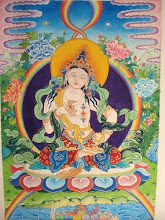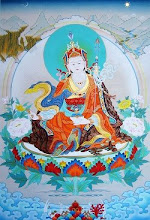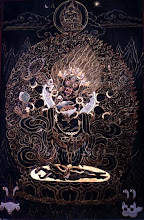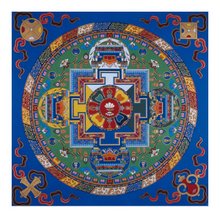 While the production aesthetics in this introduction to Tibetan medicine are not terribly high, the scriptwriter and producer have made an informative film worth the attention of anyone interested in Tibetan culture or traditional medicine. Included are extensive interview segments with the Dalai Lama and his former personal physician, Dr Tenzin Choedrak.
While the production aesthetics in this introduction to Tibetan medicine are not terribly high, the scriptwriter and producer have made an informative film worth the attention of anyone interested in Tibetan culture or traditional medicine. Included are extensive interview segments with the Dalai Lama and his former personal physician, Dr Tenzin Choedrak.Men-Tse-Khan, The Tibetan Medical and Astrological Institute, is located in the capital of the exile Tibetan government in Dharamsala, India and is both the producer and subject of the film. First established in 1961, the Institute is under the direct sponsorship of the Dalai Lama and carries out its charge of preserving and promoting traditional Tibetan healing arts through the operation of over 40 branch hospitals, a physicians training college, and a pharmaceuticals factory.

Tibetan Medicine: Compassionate Healing begins with basic concepts of Tibetan cosmology and science, in which illness is conceived as a physical manifestation of the Buddhist states of psychological affliction – desire, anger and ignorance – presenting physically as an imbalance of the humors, an excess or deficiency of wind, bile, or phlegm.

In working with the ill, healers employ three diagnostic tools - observation, palpitation, and interrogation. Perhaps the most unique of these is reading the pulse, through which a sensitive doctor can feel small differences in the strength, depth, and regularity of the blood and diagnose disorders in the organs. Doctors also carefully examine urine samples, which they test by stirring, whipping, shaking, pouring, smelling and sometimes even tasting.
Treatment is through the prescription of changes in behavior, the application of hot poultices, moxibustion, acupuncture, massage and other forms of physical manipulation, as well as the consumption of herbal medicines.
The ideal physician is not just a mechanic, but someone who through the application of the healing arts as well as Buddhist philosophy helps his patients achieve physical and psychic balance. As one of the doctors featured in the film notes, a physician is presented with the unique opportunity of achieving Buddhahood through the daily practice of skillful compassion for the suffering patient.

The film continues with an overview of the activities of the Men-Tse-Khan, including it's Medical College, Astrological Center, and its pharmaceutical business. Remarking on the syncretic nature of Tibetan healing arts, first codified in the 8th century CE based on the medical arts as practiced in China, India, and Persia, the Dalai Lama concludes that as a system with a history of incorporating new concepts and methods, Tibetan medicine is ideally suited to for the needs of the present world.

I have so far been unable to locate any information about this film on the web. My copy does not contain a copyright date or production credits. Any references would be greatly appreciated. Despite the claim on the DVD cover, this does not appear to be Franz Reichle's film, The Knowledge of Healing.
- Men-Tse-Khan website
#



























0 comments:
Post a Comment